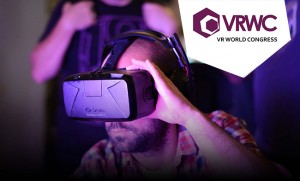Virtual reality will have a major impact on nearly all aspects of our lives – from working and resting to playing and learning, according to a new survey commissioned to ensure Bristol stays at the leading edge of the VR revolution.
While three quarters of the 2,000 people taking part in the research believe VR will have a positive impact on their lives, there are concerns over its effect on home life, with nearly half of consumers saying they were worried about its impact. 
The survey was commissioned by Invest Bristol & Bath (IBB) and was published earlier this week to coincide with a major VR conference in Bristol.
The VR World Congress, which attracted key industry figures including Samsung, HTC and AMD, helped strengthened the city’s reputation as a burgeoning VR centre.
Bristol, combined with Bath, is emerging as a one of the UK’s major centres for VR development with its mix of skills in programming, engineering, education, design, art, TV and animation.
Combined with the leading-edge work carried out in Bristol and Bath’s universities, the area can boast a skilled pool of talent and capacity for innovation unrivaled by many other city-regions.
The research was published alongside a White Paper on VR called Work, Rest and Play: How Will Virtual Reality Impact Everyday Lives?
The report finds that three quarters of people think VR will have a positive impact on their lives with men being more enthusiastic supporters than women (82% vs 69%). More women (47%) than men (39%) are worried about the impact it will have on family and mental health.
According to the survey, VR is expected to have the most impact on the gaming sector (60%) although the entertainment industry (45%) and education sector (23%) are also expected to see a significant impact. Travel (13%), defence (10%) and property/construction (9%) are also expected to see VR-related changes.
A third of respondents have actually tried a VR headset and 70% of people would consider buying one in the near future, with Samsung Gear (33%) and PlayStation VR (28%) leading the pack.
Price will play a role. Some 81% of people surveyed would pay up to £300 but enthusiasm quickly diminishes once this price point is reached. Only three per cent of people are willing to pay more than £500 – a finding that could limit the market for more expensive systems such as Oculus Rift and HTC’s Vive.
The emergence of commercial VR technologies such as Samsung Gear and Oculus Rift has led to an increase in innovation, with a wide range of businesses developing VR games and industry-specific applications.
Liz Falconer, Professor of Technology Enhanced Learning at UWE, who wrote the foreword for the report, said that while there were undoubtedly some negatives surrounding VR, there were plenty of positives too.
“The opportunities to learn safely from simulations in virtual environments before trying things out in the physical world; opportunities for people with disabilities to take part in activities and social events that would be restricted in the physical world; opportunities for people from different countries, religions and cultures to meet regularly and share experiences and understanding without having to travel to do so – all this, and more, makes me confident and excited about the future of VR,” she said.
Rick Chapman, hi-tech sector specialist at Invest Bristol and Bath – the inward investment agency for the region which commissioned the report, said: “Without doubt, some of the more intriguing and leading edge applications of VR are to be found in industry. Training simulations in particular will drive interest across business sectors. The use of VR in fixed rather than mobile environments, where you’re not reliant on carrying a VR headset around with you, present exciting opportunities – from enhanced learning and training experiences through to informed buying decisions and immersive entertainment.
“This is a big opportunity for the UK and our region, which has all the right talent, facilities and people to make a real difference in this fast developing industry.”
Heather Wright, executive producer and head of partner content at Aardman Animations, says that while it’s still early days, VR technology is worth exploring.
“Aardman is actively exploring lots of ways of telling stories in VR…and we are currently working on a new project with the BBC which takes VR in a different direction again and there will be more to say on that in a few months’ time.
“Story tellers of the film making variety traditionally like to lead the viewer on a journey which is predetermined for them. With VR, viewers are essentially being let loose in a story to explore it for themselves. This requires a whole new film grammar which is certainly exciting but does turn the tables on the film makers.”






























